Govt to move SC for TLP dissolution
Cabinet announces decision after banning Tehreek-e-Labbaik under anti-terror law
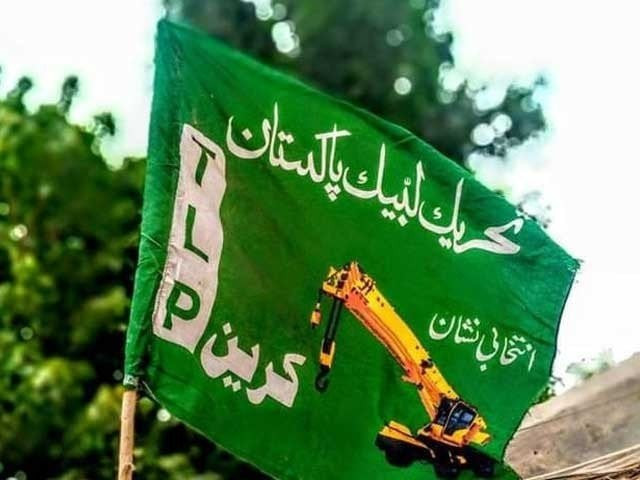
The government on Thursday decided to approach the apex court seeking the dissolution of the Tehreek-e-Labbaik Pakistan (TLP) after the federal cabinet outlawed the group under the country’s anti-terrorism law.
The cabinet’s approval of a summary to ban the TLP came in the wake of thousands of its activists and supporters staging violent protests for three straight days across the country over the arrest of their leader.
Armed with sticks, canes and in some instances guns, they went on a rampage, causing loss of life and damaging properties worth millions of rupees.
After imposing the ban, the government also decided to circulate another summary among members of the federal cabinet for the dissolution of TLP on April 16, saying the matter would then be taken to the Supreme Court.
“We tried our best to solve the issues [with TLP] through negotiations but they had extremely dangerous intentions and weren’t agreeing to go back on their agenda for April 20 [march],” Interior Minister Sheikh Rashid, accompanied by Religious Affairs and Interfaith Harmony Minister Noorul Haq Qadri, explained at a news conference in the federal capital.
“Accepting demands like expelling ambassadors could lead to an extremely difficult situation for the country,” he added, referring to the TLP seeking the expulsion of the French envoy over blasphemous caricatures.
Rashid said all ministers had signed the summary seeking their approval for declaring the TLP a proscribed organisation.
He added that another summary, under Article 172 of the Constitution (read with Section 112 of the Election Act, 2017), would be circulated among cabinet members so that the reference for the dissolution of the TLP could be filed before the top court.
He said the law minister and the attorney general for Pakistan had advised the cabinet that both the summaries should be circulated separately instead of seeking both the ban and dissolution through a single one.
The interior ministry’s notification declaring TLP a proscribed organisation read: “The federal government has responsible grounds to believe that Tehreek Labbaik Pakistan is engaged in terrorism, acted in a manner prejudicial to the peace and security of the country, involved in creating anarchy in the country by intimidating the public, [and] caused grievous harm, hurt and death to the personnel of law enforcement agencies and innocent by-standers.”
Also read: TLP protest winds down, sporadic skirmishes reported in some cities
It further read that the TLP “attacked civilians and officials, created wide-scale hurdles, threatened, abused and promoted hatred, vandalised and ransacked public and government properties including vehicles and caused arson, blocked essential health supplies to hospitals, and had used, threatened, coerced, intimidated, and overawed the government and public, creating a sense of fear and insecurity in the society and the public at large.”
Therefore, it added, in exercise of the powers conferred by Section 11B(1) of the Anti-Terrorism Act, 1997, the federal government was adding the TLP to the First Schedule of the Act as a proscribed organisation.
وزارت داخلہ نے وفاقی کابینہ کی منظوری کے بعد انسداد دہشتگردی ایکٹ 1997 کے تحت تحریک لبیک پاکستان کو کالعدم قرار دے دیا۔
— Sheikh Rashid Ahmed (@ShkhRasheed) April 15, 2021
وزارت داخلہ کی طرف سے نوٹیفیکیشن جاری کردیا گیا pic.twitter.com/3vzB5wyjHM
“The TLP has already come to the twin cities [Islamabad and Rawalpindi] thrice and they were adamant on coming for the fourth time,” Rashid said, adding that no leniency would be shown to the perpetrators involved in the countrywide protests.
The minister added that the government was “pursuing the [protesters] under section 11EE” of the Anti-Terrorism Act, 1997.
“Policemen sacrificed their lives for restoring peace,” the minister said.
“[A total of] 580 policemen were injured and 30 vehicles destroyed,” Rashid added, saying that he would visit the families of the martyred cops as well as meet those injured in the clashes.
On France urging its citizens to leave Pakistan amid anti-French protests, Rashid said everything was under control.
“There is no threat to French citizens in Pakistan. They are safe,” he added, saying police and Rangers would handle everything.
In October last year, the TLP had demanded the expulsion of the French ambassador and severing of ties with France while setting a deadline for the government to present a resolution in the assembly.
The move came after a teacher in France had shown blasphemous sketches of Holy Prophet Muhammad (PBUH) in a classroom.
At the news conference, the religious affairs minister’s statement, however, raised eyebrows when he said the government was in touch with the TLP for the past two years and making efforts to mainstream it.
“I continuously engaged with the Tehreek-e-Labbaik for the past two years and we [the government] tried to bring it into the system as a mainstream political party,” Qadri said.
He added that the government did not back off from its stance on presenting a resolution in the assembly before the TLP’s April 20 deadline.
“The government and the TLP were proposing two different drafts,” he explained.
The religious affairs minister elaborated that the government was proposing a draft which would draw less “repercussions” and help avoiding a diplomatic crisis at an international level.
However, the TLP was adamant that the draft that it had prepared should be adopted.
Qadri said the TLP had given a call for a sit-in and long march while negotiations were under way.
Also read: Unrest in garb of protest won’t be allowed: PM
“With the permission of the NA speaker, the government offered them to form a parliamentary committee having representation from all political parties to discuss the contents of the proposed drafts but TLP officials proceeded with the protest call and made arrangements,” the minister added.
“They did not agree with the proposal of forming a parliamentary committee or preparing a draft. They were adamant on whatever they were saying should be accepted and passed by parliament.”
Qadri said that the reaction by TLP leaders and activists after the arrest of their leader could not be called religious, moral or in line with Shariah.
In response to a question, Rashid said “no resolution” was being presented in the National Assembly in this regard anymore.



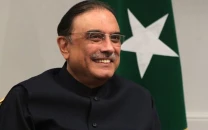
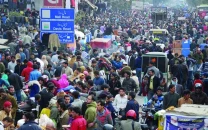
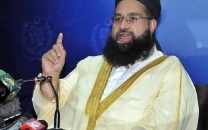
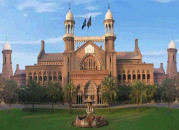












COMMENTS
Comments are moderated and generally will be posted if they are on-topic and not abusive.
For more information, please see our Comments FAQ